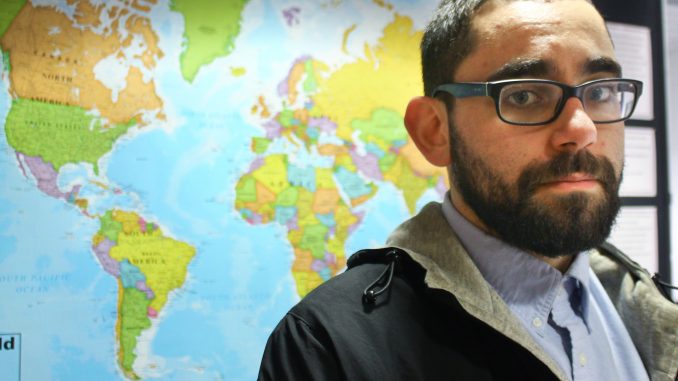
One day last semester, Eli LaBan set up his camera in a village on the Southern Caribbean coast of Nicaragua. Soon, dozens of Garifuna-speaking people lined up behind it to be featured in LaBan’s video series — “Learn to Count in an Endangered Language.”
“People were really excited,” said LaBan, a senior media studies and production major. “Even if they didn’t know how to count, they were lining up. There were all these little kids around.”
The video series featured Nicaraguan people counting to 10 in their native languages of Garifuna, Rama and Miskito. LaBan said the languages are close to going extinct because of the people’s remote location in a predominantly Spanish-speaking country. LaBan filmed the series while he was on an independent study abroad program in Nicaragua during Fall 2016.
The series was nominated for a College Television Emmy Award in the “Series-Unscripted” category. LaBan is attending a ceremony on May 24 where the results will be announced. Last year, he interned at NBC10 and won a professional Emmy from the Mid-Atlantic Chapter of the National Academy of Television, Art & Sciences for his work on “Generation Addicted,” a documentary about Philadelphia’s opioid epidemic.
LaBan was also named as the 2017 Alice Rowan Swanson fellow for the School for International Training — the company that organized LaBan’s first trip to Nicaragua. The fellowship will support LaBan during another trip to Nicaragua this summer so he can create more videos about the Rama language and the area’s indigenous, sustainable farming methods.
LaBan first thought of the idea for the series during one of his trips to the Caribbean coast.
“The contrast is huge between the Caribbean and the rest of the country because there’s all these languages going on in the street,” LaBan said. “There’s this real mixture of totally unique cultures and stuff that doesn’t really exist anywhere else in the country. So immediately I was struck by it … and I knew I wanted to do my project there.”
After he visited the Caribbean coast, LaBan had a month to figure out how he could create a final project that incorporated the region. While staying with a family in Bluefields, Nicaragua, he realized that their languages could be lost within his lifetime.
“Through talking to the people I met and learning more about the region, I learned that everything that had struck me that was so unique is disappearing,” he said. “So through the process it felt like a perfect thing to make use of my video skills in a very constructive way that could actually have a potential impact on the way that people view this kind of issue.”
When he posted his videos on Facebook, LaBan said he was amazed by the reaction they received.
Spanish-speaking Nicaraguans commented saying that they had no idea these different languages existed, and Nicaraguans who lived on the Caribbean coast said they were excited to see their languages and culture highlighted.
LaBan created his first documentary about four local artists in Spring 2015, while enrolled in Kristine Weatherston’s Genres of Media Production class. Weatherston, a media studies and production instructor, said LaBan represents all the things she loves and values in a student.
“He’s a visually skilled artist with a deep commitment to storytelling … someone who starts and finishes a project no matter how difficult and, most importantly, he’s someone who willingly shares his work with the world,” she said.
Paul Gluck, the general manager of TUTV — where LaBan has had some content broadcasted — wrote in an email that he hopes that LaBan will win the student Emmy.
“Eli’s rich sense of empathy is what, in my opinion, offers a personal connection between the people we meet in his films and the audience members who are watching,” Gluck wrote. “His respect for the intelligence of the viewer is uncommon in modern media, but is quite welcome from my perspective.”
After seeing the success of his project, LaBan said he wants to bring more attention to Nicaragua’s Caribbean coast. He said he hopes to create a template so other students can continue making content for the project once he leaves.
“I feel like that was such a great way to discover something that no one else around here knows about and it’s easier to make work that will have a potential impact in a place that gets less exposure,” LaBan said.
Taylor Horn can be reached at taylor.suzanne.horn@temple.edu.
Editor’s Note: Eli LaBan formerly shot multimedia for The Temple News. He had no involvement in the editing or reporting of this story.


Be the first to comment